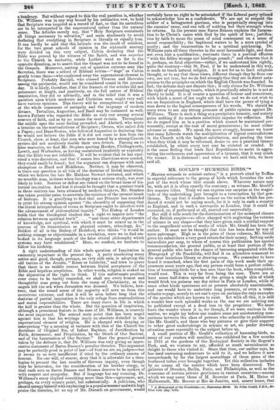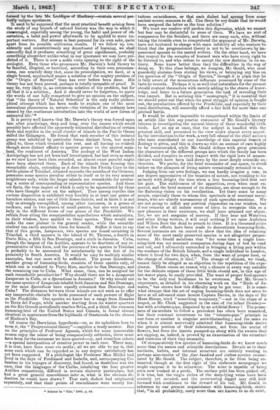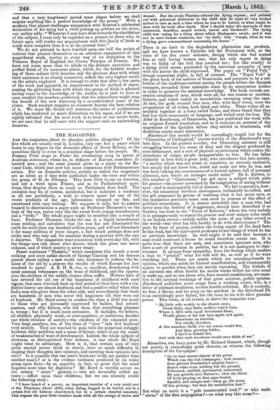MR. GOULD'S "HUMMING BIRDS."* "Maxima toranda in minimis nature," is
a proverb cited by Buffon in especial reference to the group of birds which furnishes the sub- ject of the work whose title stands above. Whatever nature may be, with art it is often exactly the contrary ; as witness Mr. Gould's five massive folios. Truly we can express our surprise at the magni- tude of the undertaking just brought to a termination by that gen- tleman. To say that it confers honour on the nation which has pro- duced it would not be saying much, for it is only in such a country as England, and in such a metropolis as London, that it could be executed, or, if performed at all, carried out successfully.
But still it tells much for the discrimination of the moneyed classes of the British empire—so often charged with neglecting the votaries of science in any shape—that they have given such a cordial support to the mon ¢ series of works of which Mr. Gould has been the
I
author. t must not be thought that this has been done by way of mere patronage. High as is the price of these volumes, Mr. Gould gives his subscribers a very good return for their money. Setting aside naturalists pur sang, to whom of course this publication has special recommendation, the general public, or at least that portion of the general public who have the chance of becoming acquainted with the Monograph of the Trochilidee, will find it an attractive ornament to the most luxurious library or drawing-room. We remember to have heard it remarked, when the first parts of this work made their ap- pearance some years ago, that any person could form a perfect collec- tion of humming-birds for a less sum than the book, when completed, would cost. This is very far from being the case. There are at least some half-dozen species of the group a single skin of which would fetch ten guineas any day either in Paris or London, while of some other kinds specimens are at present absolutely unattainable, and one would have to undertake long journeys, or even a trans- atlantic voyage, merely to set one's eyes on perhaps the only examples of the species which are known to exist. Yet with all this, it is still a wonder how such splendid works as the one we are noticing can. be published except at a dead loss to the proprietor. We must leave the wonder where it is, for though, if we were curious in the matter, we might lay before our readers some not uninteresting com- parisons between the class of 'persons who subscribe to publications like Mr. Gould's, and those who buy pictures or give their support to other great undertakings in science or art, we prefer drawing attention more especially to the subject before us.
A small portion of Mr. Gould's collection of humming-birds, as many of our readers will recollect, was exhibited for a few months in 1851 at the gardens of the. Zoological Society in the Regent's Park, and, we venture to say, afforded as much astonishment as. delight to those who visited it. Since that time, our author says, he has used unceasing endeavours to add to it, and we believe it now comprehends by far the largest assemblage of these gems of the feathered tribes ever brought together. Yet this collection includes by no means all the species which have been discovered. The galleries of Dresden, Berlin, Paris, and Philadelphia, as well as the museums of certain private gentlemen in various countries—among which we may name those of M. Bonrcier at Paris, M. Heine at Halberstadt, Mr. Reeves at Rio de Janeiro, and, nearer home, that
* A ilottograpit of the Trochilide ;.or, iletameiteg-Binte. By John Gould, F.B.S., *AL Five vols. imp. folio.
ing a series of corresponding or representative species. And these his gaze. The suddenness of the apparition, even when
—a special interposition of creative power in each case. There may, Of comparatively few species of humming-birds do we know much it is true, have been sonic via media; all we are able to say is, that more. than the names and scientific descriptions. Details as to their none such which can be regarded as in any degree satisfactory has instincts, habits, and internal structure are entirely wanting in yet been suggested. If a philologist like Professor Max Muller had perhaps nine-tenths of the four hundred and sixteen species enume- lived in the days of Ferdinand and Isabella, and, accompanying Co- rated by Mr. Gould. The subject, therefore, is far from being ex- lumbus in his voyages of discovery, had found, doubtless was the hausted, though at the first sight of this elaborate monograph we case, that the languages of time Caribs, inhabiting the four greater, might suppose it to be otherwise. The mine is capable of being Antilles respectively, differed in certain dialectic particulars, but even now worked at a profit. The surface gold has been picked off, had a great general resemblance inter se, what is the obvious de- it is true, but the virgin riches of the deep-lying ,veins have been &lotion he would have drawn ? That each dialect had originated scarcely yet invaded, and the persevering digger may still look separately, and that their points of resemblance were merely for- forward with confidence to the reward of his toil. Mr. Gould, in reference to our present acquaintance with humming-birds, states that, "in all probability, many more than are known to us do exist,
* &later in" Ibis," 1860, p. 89.
the study of any branch of natural history was the way in which it We trust our readers will pardon this digression, which we cannot encouraged, especially among the young, the habit and power of oh- but fear may be distasteful to some of them. We have no sort of servation, a habit and power afterwards to be applied to more im- compassion for the Sciolists, and there are many such, who, without portant matters. But science is best pursued for its own sake, quite taking the trouble even to comprehend the argument of Mr. Darwin, apart from its possible utilitarian results. If we follow up con- have not hesitated to charge with open infidelity all who venture to sistently and conscientiously any department of learning, we shall think that the progressiorust theory is not to be overthrown by im- assuredly find it produces something of great significance, probably passioned appeals to the sacred writers. On the other hand, we have something altogether unlike-what in our ignorance we may have pre- due respect for the scruples of learned men who have every right to dieted of it. There is now a noble vista opening to the sight of the be listened to, and who refuse to accept the new doctrine in its en- zoologist. Even those who pronounce Mr. Darwin's hold theory to tirety. None know better than they the difficulties in the way of be fanciful, illogical, or heretical, according to their own preposses- doing so. To this class belongs, we imagine, Mr. Gould, who most sians, can scarcely deny that, since its promulgation, we have, at a guardedly abstains from stating his views, or betraying any bias on single bound, approached nearer a solution of the mighty problem of the question of the " Origin of Species," though it is plain that he the " Origin of Species" than has ever before been done. His is fully aware of the momentous influence possessed by some of the theory has uot been proved, perhaps is totally incapable of proof. It facts he records. Perhaps it is as well that naturalists for the present i may be, very likely s, an erroneous solution of the problem, but for should content themselves with merely adding to the stores of know. all that it is a solution. And it should never be forgotten, to quote ledge, and leave to a future generation the task of revealing their the words of one fully competent to give an opinion on the subject, true import. But in noticing this " moftograph," it is essential that that "the theory of Natural Selection' is the only really philoso- we should point out that when the great struggle of opinion is fought phical attempt which has been made to explain one of the most out, the peculiarities offered by the Trocheidce, and especially by their anomalous phenomena in nature—the violation of its ordinary laws local distribution, will assuredly afford a fair field for more than one caused by the continuous introduction into the world of new forms of pitched battle. animated life."* It would be almost impossible to comprehend within the limits of It is pretty well known that Mr. Darwin's theory was forced upon an article like this any concise statement of Mr. Gould's literary him after ponderings, deep and long, over the causes which could labours in investigating the natural history of these wonderful little possibly have affected the apparently whimsical distribution of certain birds. Let us say at once, that the subject is handled with the birds and reptiles in the small cluster of islands in the Pacific Ocean greatest skill, and presented to the view under almost every aspect. dolled the Galapagos. He found that each member of this isolated In the introduction to the work, a very full resumeof the chief authors. group was inhabited by particular forms distinct from, but nearly who have contributed to our knowledge of this especial branch of allied to, those which tenanted the rest, and all having an evident Zoology is given, and this is drawn up with an amount of care highly though more distant affinity to species proper to the nearest main- to be recommended, while Mr. Gould defines with great precision land, the continent of America. The zoology of the West Indian the characters of the different groups into which the family has been Archipelago has not yet been half investigated, but had even as much divided, and complies in every respect with the rigid laws of nomen- as we now know been then recorded, an almostexact parallel might cloture which have been laid down by the most deeply scientific an- have been observed there. Each of the islands thus forming this thorities. We prefer, for the brief remainder of our space, to dwell remarkable chain, extending as it does from the Florida Cays to the rather on the glimpses of living nature occasionally revealed to us. fertile plains of Trinidad, situated opposite the mouths of the Orinoco, Judging from our own feelings, we can hardly imagine a man, in possesses some species peculiar either to itself or to its very nearest any degree appreciative of the beauties of nature, not recalling to his neighbours only, while the larger islands are remarkable for produc- memory with delight the time when a live humming-bird first met i most er- and that a very lengthened period must elapse before we shall acquire anything like a perfect knowledge of the group." With a modesty °
that almost challenges comparison with Newton's celebrated declaration of his beire, buta child 'sicking up pebbles on the shore, our author adds : "Whatever I may have done towards the elucidation of the subject, I must only be regarded as a pioneer to those who, in future ages, will render our acquaintance with this family of birds so much more complete than it is at the present time." We do not pretend to have touched upon one half the points of interest that present themselves on an attentive examination of this magnificent work, worthy in every way of its dedication to the Princess Royal of England, the Crown Princess of Prussia. We have not room more than to allude to the delicate execution and perfect finish of its numerous plates, which, for the faithful render- mgof these radiant little beauties and the glorious flora with which their existence is so closely connected, reflect the very highest credit on the artists employed. It is enough to state that after a few parts of the work had appeared, an improvement in the method of repre- senting the glittering hues with which this group of birds is adorned having come to the knowledge of the author, he is said to have at once recalled the numbers published, that his subscribers might reap the benefit of the new discovery by a re-embellished issue of the plates. Such conduct requires no comment beyond the bare relation of it. We trust Mr. Gould will continue the series of publications which has conferred so much distinction on his name, and if we are rightly informed that his next work is to treat of our native birds, we are sure that he will meet with the support such an undertaking deserves.
































 Previous page
Previous page